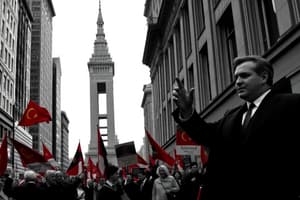Podcast
Questions and Answers
What is the main point of Marx's quote, 'The philosophers have only interpreted the world, in various ways. The point, however, is to change it.'?
What is the main point of Marx's quote, 'The philosophers have only interpreted the world, in various ways. The point, however, is to change it.'?
- Philosophers have all the answers.
- We need to take action to change society. (correct)
- Philosophers should only interpret the world.
- Understanding the world is enough.
What does Marx mean by 'Workers of the world, unite!'?
What does Marx mean by 'Workers of the world, unite!'?
Workers should join forces against capitalism.
How does Marx describe religion in his quote about it?
How does Marx describe religion in his quote about it?
As the sigh of the oppressed creature and the opium of the people.
What does Marx assert about the history of societies?
What does Marx assert about the history of societies?
What is the main idea behind the quote, 'From each according to his ability, to each according to his needs'?
What is the main idea behind the quote, 'From each according to his ability, to each according to his needs'?
What does the theory of the Communists sum up in Marx's quote?
What does the theory of the Communists sum up in Marx's quote?
What concern does Marx express in the quote about the production of useful things?
What concern does Marx express in the quote about the production of useful things?
What does Marx criticize about elections in the quote regarding the oppressed?
What does Marx criticize about elections in the quote regarding the oppressed?
What analogy does Marx use to describe capital in his quote about 'dead labor'?
What analogy does Marx use to describe capital in his quote about 'dead labor'?
What do the ruling ideas of each age reflect, according to Marx?
What do the ruling ideas of each age reflect, according to Marx?
Flashcards are hidden until you start studying
Study Notes
Karl Marx Quotes Study Notes
-
"The philosophers have only interpreted the world, in various ways. The point, however, is to change it."
- Critiques philosophers for only discussing the world without taking action.
- Calls for active engagement against social injustices and class struggles.
- Encourages people to change society for the better rather than merely understanding it.
-
"Workers of the world, unite! You have nothing to lose but your chains!"
- A rallying cry for workers to unite against the struggles created by capitalism.
- Emphasizes the strength in solidarity and collective action.
- Highlights the potential for breaking free from exploitation.
-
"Religion is the sigh of the oppressed creature, the heart of a heartless world, and the soul of soulless conditions. It is the opium of the people."
- Describes religion as a temporary comfort for those suffering from social injustices.
- Compares it to opium, indicating it distracts from addressing real societal problems.
- Argues for action to change the root causes of inequality rather than relying on religious solace.
-
"The history of all previous societies has been the history of class struggles."
- States that historical progress is defined by conflicts between social classes.
- Highlights the significance of resource control and power dynamics in societal evolution.
- Advocates for understanding these class struggles to grasp historical changes.
-
"From each according to his ability, to each according to his needs!"
- Represents the core of communist ideology advocating for communal contribution and support.
- Rejects the idea of wealth hoarding, promoting equitable distribution based on needs.
- Envisions a society beyond exploitation and class division.
-
"The theory of the Communists may be summed up in the single sentence: Abolition of private property."
- Summarizes a fundamental goal of communism: eliminating private ownership of productive resources.
- Advocates for community ownership to address inequalities stemming from private property.
- Aims for a society where resources are shared equitably among all.
-
"The production of too many useful things results in too many useless people."
- Expresses concern about the negative consequences of excessive material production.
- Warns that focusing solely on production can devalue individuals not contributing to the economy.
- Highlights the need for societal recognition of individual worth beyond economic utility.
-
"The oppressed are allowed once every few years to decide which particular representatives of the oppressing class are to represent and repress them."
- Critiques the electoral system where oppressed classes choose from oppressors.
- Argues that such choices do not fundamentally change power structures.
- Emphasizes the need for deeper, structural changes beyond mere electoral participation.
-
"Capital is dead labor, which, vampire-like, lives only by sucking living labor, and lives the more, the more labor it sucks."
- Compares capital to a vampire, highlighting its dependence on exploited labor.
- Claims capital thrives on the extraction of value from workers without contributing to production.
- Illustrates the exploitative nature of capitalism and its impact on worker relationships.
-
"The ruling ideas of each age have ever been the ideas of its ruling class."
- Asserts that dominant cultural and societal ideas are shaped by the powerful ruling class.
- Points out that the ruling class controls education and media, influencing societal beliefs.
- Suggests that widely accepted ideas often serve the interests of those in power, perpetuating inequality.
Studying That Suits You
Use AI to generate personalized quizzes and flashcards to suit your learning preferences.




